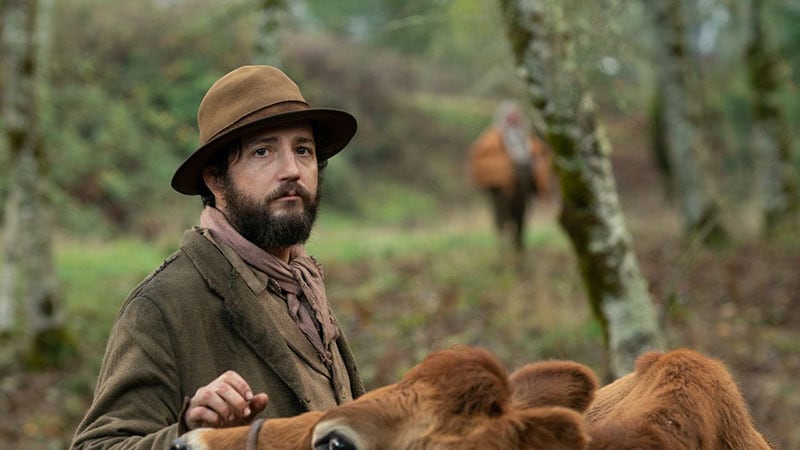Midway through Kelly Reichardt's new Western, First Cow, its two main characters wage the eternal Oregon debate.
King Lu (Orion Lee) takes stock of the 1820s Umpqua River region, all dewy and wild, and sees newness. For him, that equals economic promise: Specifically, he'll steal milk from the Territory's first cow to use as the key ingredient for his proto-doughnut business. "History hasn't come here yet," King Lu urges his partner Cookie (John Magaro). The baker, on the other hand, takes a laconic, long view. The Northwest appears old to him, as ancient as the mushrooms he hunts for grub.
It might then seem a relevant question for Reichardt—who's made several of this century's best Oregon-set films—whether she's felt the ever-evolving friction between promise and preservation while living here part time and shooting five features in the state. But it's no contest in the mind of the 56-year-old American master. Ugly modernity won.
"Really? Now, in Portland, you have to plan around traffic. I don't buy your premise," says Reichardt, whose new film comes to Video on Demand on July 10 after COVID-19 blocked its theatrical run in March. "I drive around and see all the clear cuts. Some of the forests we shot Old Joy [2006] in aren't even there. Sorry to be such a downer."
It's probably too romantic a question. If not quite downers, Kelly Reichardt movies slice to the bottom rungs on Maslow's hierarchy of needs with little sentiment. Wendy and Lucy (2008) snapshots a woman living out of her car in North Portland. Meek's Cutoff (2010) follows a party of starving settlers across Eastern Oregon. And the protagonists of Certain Women (2016) and Old Joy desperately seek human lifelines to avoid tumbling into self-defeat utterly alone.
While its central friendship is tender and its budget slightly bigger (Reichardt's first outing with producer-distributor A24), First Cow honors the director's standards of hushed grit. It's a Western about the people Westerns are historically never about: a Chinese immigrant on the run and the meek cook of a trapping party. Without each other and their baking gambit, they'd both very likely be dead. The audience picking up on those stakes owes much to the film's fastidious re-creation of the nearly 200-year-old Fort Umpqua.
"The props department had a field day," Reichardt says, crediting the Confederated Tribes of Grand Ronde's Chachalu Museum for guidance in depicting traditional artifacts like cedar capes, dentalia shells and a polenta-style acorn dish mixed in river sand.
Attention to such details is more than just due diligence. Reichardt's films consistently hinge on how labor occupies days, minds and hands. For that reason, "patient" is one of the most common descriptors of her work. So long as that's not code for "boring"—First Cow is one of the most tactile and engrossing movies of 2020—it's a fit.
"[My films] do have their own natural rhythm," Reichardt says. "Certainly, time is experienced differently [in 1820]. It's more that everything has gotten so fast. It feels like something not to buy into, this idea of never letting a thought last longer than three seconds. I feel resistant to it, but it's also just my natural pace."
It's a cadence she shares with Jonathan Raymond, the Portland author and screenwriter with whom she's now collaborated five times. First Cow is adapted rather loosely from his 2004 novel, The Half-Life, tackling less than half the book and inventing the all-important cow for this parable of early American capitalism.
Reichardt's trademark pacing also stems from her editing all her own work, a rarity in this era. Fittingly enough, that self-editing began from simple resource scarcity.
"I didn't have any money when I finished shooting [River of Grass]," says Reichardt, recalling her 1994 debut. "Now [editing] informs how I want to shoot. It's very nice after the community effort with the crew to be back in a quiet and dark room, like, 'OK this is the actual film I shot, and this is the film I'm making.'"
Or maybe the acclaimed director edits for the same reasons her characters cook and sweep and carve: "It's not good to get too far from keeping your hands on something."
SEE IT: First Cow streams on all digital platforms starting July 10.

